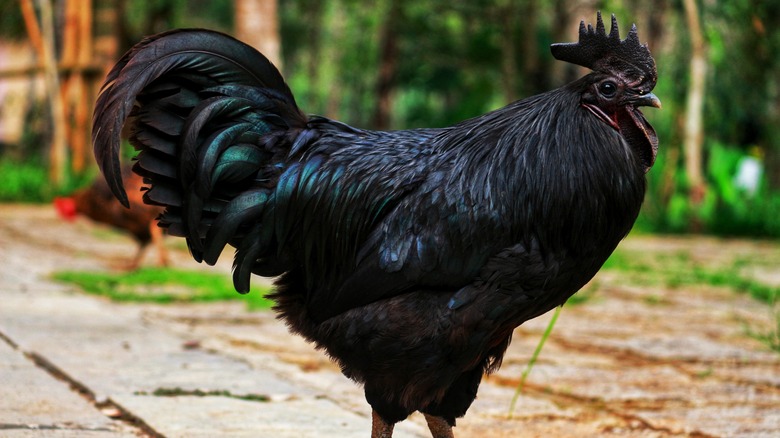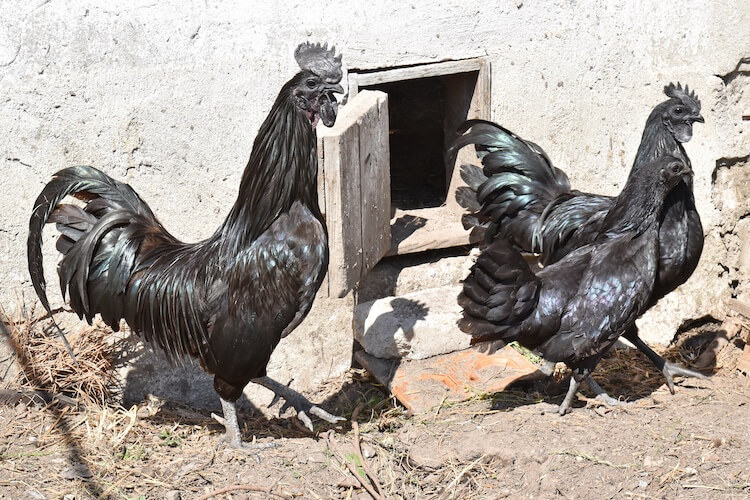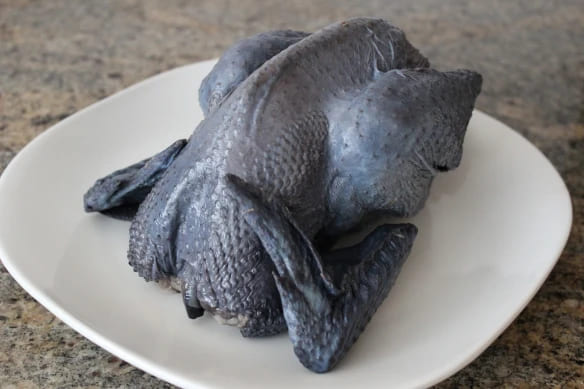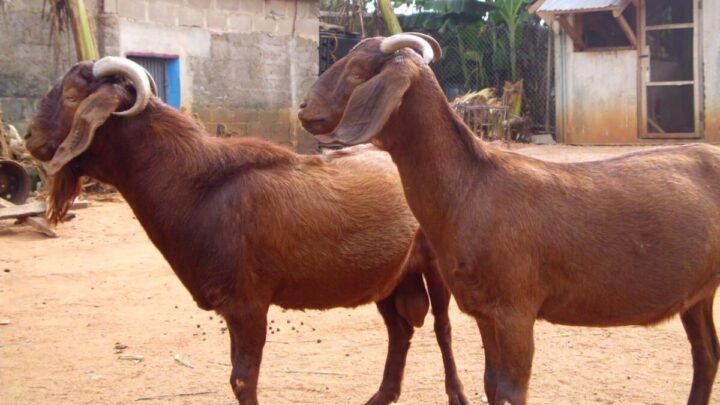Last updated on July 30, 2025
Let me hit you with the truth right away—Ayam Cemani chickens aren’t just rare; they’re straight-up legendary. From their jet-black feathers to their shadowy folklore, these birds are wrapped in mystery, culture, and, let’s be honest, a whole lot of hype. They’re not your average backyard chicken—and trust me, once you learn their story, you’ll see why they’re called “the Lamborghini of poultry.”
Whether you’re curious about raising Ayam Cemani chickens, buying one, or just fascinated by the black-on-black look (yes, even their bones!), this guide dives deep into what makes them so unique. I’ll walk you through everything: their care, price, egg-laying secrets, meat quality, myths, and what it really means to own the world’s rarest chicken breed.
What Makes Ayam Cemani So Rare and Expensive?
First off, let’s talk rarity. Ayam Cemani chickens come from Indonesia and are famous for their fibromelanosis—a genetic mutation that causes hyperpigmentation. It makes everything from their skin to their organs to their bones black. This rare trait is what drives their price sky-high.




Some top-quality birds in the U.S. sell for $2,500 each, according to the Livestock Conservancy and Greenfire Farms. In Nigeria, you might see prices between ₦300,000 and ₦10,000,000, depending on purity and availability. Why so pricey? Because true, 100% Ayam Cemani are incredibly hard to breed—and importing them legally is a whole saga of paperwork, biosecurity checks, and quarantine protocols.

Quick Facts About the Ayam Cemani Chicken:
- Origin: Java Island, Indonesia
- Color: All-black everything (feathers, skin, meat, organs)
- Weight: Roosters ~4.5–6.5 lbs; hens ~3.5–5 lbs
- Temperament: Calm, curious, and friendly
- Eggs: Cream-colored, not black! (We’ll get to that myth later.)
- Price: $50 to $2,500 depending on genetics and location
- Use: Breeding, ornamental, cultural, and sometimes meat
Now, let’s peel back the layers and dive into what makes these birds so darn fascinating, starting with their mind-blowing appearance…
Ayam Cemani Chicken Guide: Physical Characteristics and Unique Traits
Now that you’re familiar with the mysterious nature of Ayam Cemani chickens, it’s time to dig into what makes them truly unique. From their striking appearance to some questions you might be wondering about, this breed is full of surprises.
All-Black Feathers, Skin, and Internal Organs
First things first—the most obvious feature of the Ayam Cemani is its stunning all-black appearance. And when I say all-black, I mean everything. These chickens have jet-black feathers that shimmer in the light, their skin is black, their beaks, legs, and eyes all carry the same dark hue. It’s honestly hard to look away once you see them.




But here’s the most mind-blowing part—their internal organs are black too. That’s right: not only is their skin and feathers black, but even their bones, muscles, and internal organs take on that dark, mysterious color. This rare trait comes from a genetic condition called fibromelanosis, which causes an overproduction of melanin—the pigment responsible for that rich black color. It gives them a completely unique look, making them one of the most sought-after and revered chicken breeds in the world.
Do Ayam Cemani Have Black Bones?
I’m sure you’ve heard the rumors—Ayam Cemani chickens have black bones—and it’s not a myth. Thanks to that special fibromelanosis mutation, their bones are indeed black. If you ever get the chance to look inside a freshly butchered Ayam Cemani, you’ll see black bones and cartilage instead of the usual white you’re accustomed to with other chickens.
What’s fascinating is that the black isn’t just superficial. It’s deep-rooted in their anatomy, meaning the bones themselves contain melanin. However, the reason behind this unusual trait isn’t fully understood by scientists, but it’s what makes the Ayam Cemani so different from every other chicken breed out there.
Do They Have Spurs?
Yes, Ayam Cemani chickens do have spurs, just like most other chicken breeds. Spurs are sharp, bony protrusions that grow on the legs of male chickens (roosters). While spurs are more commonly associated with roosters, hens (female chickens) can have them too, though they’re typically smaller and less pronounced.




In Ayam Cemani, the spurs are dark, matching their overall black theme. If you’re considering getting an Ayam Cemani as part of your flock, don’t be surprised if your rooster shows off those spurs, especially when he’s showing off for the ladies or defending his territory. They may be beautiful, but they aren’t afraid to use their spurs when necessary!
Can They Fly?
Okay, so we’ve covered how they look—but what about their flying abilities? You might imagine these beautiful black birds would glide through the air like little shadows, but unfortunately, Ayam Cemani chickens don’t fly very well.
Like many other domesticated chicken breeds, they’re more focused on staying grounded and foraging than they are on taking flight. While they can flutter short distances to escape danger or get onto a perch, they’re not known for flying long distances like wild birds. This is because domestic chickens have been bred for specific traits—such as egg-laying or meat production—rather than flight.
That said, it’s always a good idea to have high fences or enclosed areas for your Ayam Cemani if you’re raising them in your backyard, especially if you don’t want them wandering off or being snatched by predators.



Ayam Cemani Temperament and Behavior Traits
If you’re thinking about raising Ayam Cemani chickens, you might be curious about their temperament. After all, looks can be deceiving, right? While their striking black appearance might make them seem a bit intimidating, the personality of these chickens is actually quite the opposite. Let’s look into their behavior and find out what makes these rare birds tick!
Are Ayam Cemani Aggressive or Calm?
The Ayam Cemani is generally considered a calm and gentle breed, especially compared to other more aggressive chickens. These birds aren’t known for being feisty or mean, which is a relief if you’re worried about them picking fights in the flock.
In fact, roosters (the males) are often pretty chill, even though they have that natural protective instinct. They don’t typically show much aggression unless provoked or threatened. If you’ve raised other chickens, you’ll notice that the Ayam Cemani roosters tend to be more laid-back than some of the hot-headed breeds out there.
Are They Good Pets?
Here’s where things get interesting. If you’re considering the Ayam Cemani as a pet, you’re in for a treat. These chickens are actually pretty friendly and affectionate when raised correctly. They’re not as skittish as some other breeds, and while they might not jump into your lap for cuddles, they will bond with their caretakers over time.




Because they’re naturally calm, they can make for great pets—especially if you have a backyard flock. They’re good with other chickens too, thanks to their relatively peaceful nature. However, just like with any breed, the key to a happy Ayam Cemani is proper socialization from a young age. The more they’re handled, the more they’ll trust you. And who knows, you might even get one that follows you around like a loyal pup!
Social Habits and Flock Dynamics
When it comes to socializing with other chickens, the Ayam Cemani is typically a well-behaved and social bird. They’re not loners, so you’ll find them interacting with the other chickens in your flock. Their flock dynamics are usually pretty smooth because these birds tend to get along well with others.
But here’s the catch—Ayam Cemani are known to be a bit on the shy side, especially around people they don’t know. If you have a mixed flock, they may stick to themselves at first, but over time, they’ll adapt and integrate. Roosters, in particular, tend to be a bit more protective of their hens, but overall, they don’t display the same level of aggression you might see with other breeds.
They prefer a calm and peaceful environment, and too much chaos or stress can throw off their behavior. So, if you’re raising them, make sure to provide them with a safe, quiet space and avoid overcrowding, as they’re not the most resilient when it comes to stressful conditions.




In summary, Ayam Cemani chickens are calm, gentle, and well-suited for people who want a peaceful and low-maintenance flock. While they might not be as interactive as some other pet animals, they still have a strong social nature and make excellent companions for anyone looking to add a bit of mystical charm to their backyard.
Ayam Cemani Chicken Guide to Care: How Hard Are They to Raise?

Raising an Ayam Cemani might seem intimidating due to their rare and mysterious nature, but in reality, they’re not all that hard to care for—if you know what to expect. These striking black chickens may require a little extra attention, but with the right environment and care, they’ll thrive just like any other breed. Let’s break it down.
Are Ayam Cemani Hard to Raise?
The good news? No, they’re not particularly hard to raise. But here’s the catch: because Ayam Cemani chickens are so unique, they do have some specific needs that can make them slightly more demanding than your average flock. But don’t let that discourage you!
The key to raising these beautiful birds is providing the right environment and giving them proper attention. If you already raise chickens, you’ll find their care requirements to be similar to many other heritage breeds. However, they do have some characteristics that are worth considering:



- Social nature: They thrive in small flocks, so it’s best to have at least two or three of them. They enjoy company and aren’t great solo chickens.
- Shyness: Ayam Cemani can be a bit more skittish compared to other breeds, so be patient and handle them gently to build trust.
- Health attention: Like all chickens, they need regular health checks, but the Ayam Cemani is a fairly resilient breed overall. Just watch out for parasites and common poultry illnesses.
Can Ayam Cemani Live in Cold Weather?
Ayam Cemani chickens aren’t known for their cold tolerance. Like many tropical breeds, they’re more comfortable in warmer climates. However, that doesn’t mean they can’t survive in colder temperatures—they just need a bit of help to stay comfortable.
Here’s what you can do if you live in a colder area:
- Provide a warm, insulated coop: Insulation is key, especially in freezing winters. Make sure the coop is draft-free, and use deep bedding to help them stay warm.
- Ensure proper ventilation: While you need to keep the coop warm, ventilation is still crucial to avoid moisture build-up, which can lead to frostbite or respiratory issues.
- Add a heat source: If temperatures drop too low, consider adding a safe, low-wattage heat lamp to keep the coop warm enough for them to be comfortable. But be sure to avoid overheating the space.
While they won’t thrive in extreme cold, with the right precautions, they can manage in cooler climates.
Daily Care Needs, Space, and Shelter
Just like any chicken breed, Ayam Cemani have basic care requirements that need to be met every day:




- Food and Water: These chickens aren’t picky eaters. They’ll enjoy a balanced diet of high-quality chicken feed, supplemented with grains, vegetables, and greens. Make sure they always have access to fresh, clean water.
- Shelter: A safe, dry, and clean coop is essential. Provide them with enough space (at least 2-3 square feet per chicken inside the coop) to prevent overcrowding, which can lead to stress and health issues. If they’re allowed to free-range during the day, make sure they have access to a secure area where they’re safe from predators.
- Dust Bathing: These chickens love a good dust bath, so provide an area with loose dirt or sand where they can roll around and keep their feathers clean.
Best Climate and Coop Tips
When it comes to the best climate for Ayam Cemani, they thrive in moderate to warm conditions, with temperatures between 50°F to 85°F being ideal. In hotter climates, make sure they have plenty of shade and access to fresh water throughout the day. If you live in a particularly humid area, they’ll also appreciate the ability to cool off in the shade.
Here are a few coop tips to make sure your Ayam Cemani thrive:
- Protection from predators: Always ensure your coop is secure. They’re small and can be an easy target for larger predators like raccoons, foxes, and hawks. Strong wire mesh and secure locks are a must.
- Flooring: Use a solid floor in your coop (no dirt floors) to make cleaning easier and to avoid damp conditions. Wood shavings or straw work great for bedding.
- Roosting: Install roosting bars at varying heights (to mimic natural environments) to give your chickens a comfortable place to sleep.
In summary, while Ayam Cemani chickens aren’t necessarily difficult to raise, they do have specific needs, especially when it comes to temperature and space. With proper care, a well-insulated coop, and a safe environment, you’ll find these beautiful, black birds are a wonderful addition to your flock. If you’ve raised chickens before, you’ll likely find the Ayam Cemani to be a unique yet manageable breed to take care of!
Feeding and Health: Keeping Your Ayam Cemani Healthy
Raising a healthy Ayam Cemani starts with a solid feeding and care routine. These rare, black-feathered beauties require a nutritious diet and a little extra attention to stay in top condition. Let’s dive into their feeding habits, common health concerns, and how to keep them thriving with natural supplements.
What Do Ayam Cemani Chickens Eat?
Ayam Cemani chickens are omnivores, which means they need a balanced diet that includes both plant-based and animal-based foods. A healthy, well-rounded diet will ensure they grow strong and remain disease-free.
Here’s what to feed them:
- Commercial Chicken Feed: Start with a high-quality layer feed (if they’re laying eggs) or starter feed (if they’re chicks). A balanced commercial feed will provide the right nutrients, including protein, vitamins, and minerals.
- Grains and Seeds: Ayam Cemani enjoy grains like corn, wheat, oats, and barley. These are great sources of energy and help keep their feathers shiny.
- Greens and Vegetables: They love fresh veggies like spinach, lettuce, kale, and carrots. Dark leafy greens are excellent for their health, as they contain essential vitamins and minerals.
- Protein-rich treats: Offer mealworms, crickets, or earthworms to provide extra protein, especially if you want to boost their egg production or support healthy feather growth.
- Calcium sources: Ensure they get enough calcium for strong bones and eggshells. You can give them crushed oyster shells, calcium supplements, or even gravel to help with digestion.
Fresh water is crucial, so always make sure they have access to clean, cool water. Chickens drink a lot, especially during hot weather, so it’s important to keep their water supply fresh and clean to avoid contamination.
Common Health Issues and Prevention
Ayam Cemani chickens are generally hardy, but like any breed, they can face a few health issues. Being vigilant about their health and providing the right care can go a long way in preventing problems.
Here are some of the most common health issues you should watch for:
- Parasites: Chickens, including Ayam Cemani, are prone to external parasites like lice, mites, and ticks, as well as internal parasites like worms. Regularly check for signs of mites or lice on their feathers or skin. You can treat them with natural insecticides or food-grade diatomaceous earth, which is safe and effective.
- Respiratory Issues: Like most chickens, Ayam Cemani are susceptible to respiratory diseases like avian flu or infectious coryza. Ensure their coop is well-ventilated and free from ammonia buildup. Keep their bedding dry and clean to reduce the risk of respiratory infections.
- Feather Loss: Feather loss can occur for a few reasons, such as molting, poor nutrition, or stress. Ensure they have a balanced diet, and offer extra protein during molting to help feathers regrow. Also, make sure they have enough space to reduce stress from overcrowding.
- Egg-Binding: Egg binding is a common issue for hens, where they have difficulty passing an egg. To prevent this, ensure your hens are getting plenty of calcium and a proper diet.
Natural Supplements for Black Chicken Breeds
Ayam Cemani chickens, with their rich black features, can benefit from a few natural supplements to support their health and vitality. These supplements help boost their immune system, improve feather quality, and even support their unique pigment.
Here are some natural supplements that are especially helpful for black chicken breeds like the Ayam Cemani:
- Apple Cider Vinegar: Adding a small amount (1–2 tablespoons) of apple cider vinegar to their water can help maintain gut health and prevent infections. It can also improve their digestion and boost their immune system.
- Garlic: Garlic has natural antibacterial and antifungal properties. Adding fresh or crushed garlic to their feed can help ward off infections, improve their immune function, and even act as a natural wormer.
- Herbs and Spices: Some herbs like oregano, thyme, and peppermint are known for their antioxidant properties and can help boost overall health. You can grow them in your yard or add small amounts to their feed.
- Probiotics: Adding probiotics to their diet is an excellent way to maintain healthy digestion. It helps balance the good bacteria in their gut, which is crucial for their immune system.
- Seaweed or Kelp: Adding kelp or seaweed to their diet provides a rich source of minerals, trace elements, and iodine, which are all essential for healthy feather growth and overall vitality.
Keeping Your Ayam Cemani Healthy
A healthy Ayam Cemani starts with a nutritious diet, regular health checks, and preventive measures against common poultry illnesses. Keep their environment clean, provide them with a balanced diet, and offer natural supplements to support their well-being. By giving your chickens the care they deserve, you’ll ensure they live long, happy, and healthy lives, contributing to your flock’s overall success.
Ayam Cemani Egg Guide: Color, Production, and Value

When it comes to Ayam Cemani chickens, their eggs are as much a point of fascination as their striking all-black feathers and skin. There’s a lot of intrigue surrounding their egg color, production rates, and the value of these eggs. But what’s true and what’s just myth? Let’s break it down and uncover the truth about Ayam Cemani eggs!
Do Ayam Cemani Lay Black Eggs?
The black chicken breed is often associated with laying black eggs, and Ayam Cemani chickens are no exception when it comes to that claim. However, the truth is, Ayam Cemani chickens do not lay black eggs. In fact, their eggs are usually a cream to light brown color.
The confusion stems from their unique appearance. Since the breed is known for its all-black features, including their feathers, skin, and even internal organs, people assume the eggs would match the dark color of the chicken. While the shell of their eggs isn’t black, the inside of the eggs, like the rest of the chicken, can have some dark, rich hues. But, no, you won’t crack open a black egg.
Egg Color Truth vs Myth
So, why do people believe that Ayam Cemani lay black eggs? This idea probably comes from their striking and unusual appearance. Ayam Cemani chickens have an unusual genetic trait called fibromelanosis, which causes their skin, feathers, and internal organs to appear black. This trait can lead to the myth that everything about them, including their eggs, would be black.
In reality, the egg color of Ayam Cemani hens is simply a light brown or cream, just like many other chicken breeds. The myth of black eggs, while fun to think about, doesn’t hold up to scrutiny. However, these eggs are still special and highly valued for other reasons!
Ayam Cemani Egg Production and Quality
While Ayam Cemani chickens might not lay black eggs, their egg production is still noteworthy. These hens are considered moderate layers, meaning they aren’t the most prolific when it comes to egg production, but they still lay a decent number of eggs. You can read our guide on how many eggs do Ayam Cemani lay in egg and compare it with others.
- Egg Frequency: Ayam Cemani hens typically lay around 2 to 4 eggs per week, depending on their age, health, and environmental conditions.
- Egg Quality: These eggs tend to be of high quality, with strong shells and rich yolks. The yolk color is usually a deep golden yellow due to their healthy diet. The egg white is also firm, making them a desirable choice for cooking, especially in gourmet dishes.
- Egg Size: The eggs are typically medium-sized, not as large as some commercial breeds but still ample for most cooking needs.
Ayam Cemani Egg Price: Are They Worth It?
As mentioned earlier, Ayam Cemani eggs are a luxury and rare commodity, with prices varying based on several factors. To make it easier for international buyers, here’s a breakdown of the prices in USD, along with equivalent values in other currencies like Nigerian Naira (NGN) and several other global currencies. This can help give a better sense of the costs for those purchasing from outside the United States.
Fertile Hatching Eggs: Prices and Sellers
- Cackle Hatchery: $14.99 each
- NGN: ₦24,048.70
- Euro: €13.14
- GBP: £11.29
- Spring Hollow Acres: $15.00 each
- NGN: ₦24,074.25
- Euro: €13.22
- GBP: £11.35
- Old Redding Farm: $50.00 per order, with a $15 shipping fee
- NGN: ₦80,247.50
- Euro: €44.07
- GBP: £37.83
- Black Witch Chickens: $95.00 for 6 fertile eggs
- NGN: ₦152,472.25
- Euro: €83.76
- GBP: £71.45
- Mockingbird Homestead: $200.00 per order
- NGN: ₦324,944.50
- Euro: €167.52
- GBP: £142.89
- Bearded Lady Farms: $12.00 each
- NGN: ₦19,496.70
- Euro: €10.06
- GBP: £8.63
- Chick’n’Eggs: $7.00 each or 3 for $20.00
- NGN: ₦11,410.30 (per egg)
- Euro: €5.88 (per egg)
- GBP: £5.04 (per egg)
Table Eggs (Non-Fertile)
If you’re after table eggs, which are meant for consumption rather than breeding, the prices can be quite high:
- Exotic Meat Markets: $99.99 for 6 eggs
- NGN: ₦159,639.50
- Euro: €87.39
- GBP: £75.34
Why So Expensive?
Ayam Cemani eggs command a premium price due to the rarity of the breed and the high demand from enthusiasts and chefs alike. These black eggs are seen as a status symbol in many parts of the world, contributing to their elevated prices. The rarity of the birds and the effort required to breed and maintain them further drive up costs. The luxury appeal of owning such an exotic chicken breed or consuming its unique eggs is another reason behind the price tag.
Exchange Rates: How They Affect the Price for International Buyers
Since Ayam Cemani eggs are sold primarily in USD, here’s a breakdown of the exchange rate for some major currencies (as of April 20, 2025):
- 1 USD = ₦1,604.93 NGN (official rate)
- 1 USD = €0.8777 EUR
- 1 USD = £0.7525 GBP
- 1 USD = ₹85.4338 INR
- 1 USD = 142.1770 JPY
These exchange rates mean that for international buyers, the price of Ayam Cemani eggs can fluctuate based on the USD to your currency conversion rates. For instance, if you’re purchasing from Nigeria and paying in Naira, you’ll see a noticeable difference in the final cost depending on the market rate, with Ayam Cemani eggs costing significantly more in NGN due to exchange rates.
Is It Worth It?
For buyers in the United States, Ayam Cemani eggs may seem like an expensive but worthwhile investment. However, for international buyers, especially those in Nigeria or countries with less favorable exchange rates, the cost can feel even more significant. Despite this, many enthusiasts and culinary aficionados are willing to pay the premium for these rare eggs.
Summary: The Cost of Ayam Cemani Eggs
- Fertile Hatching Eggs: Prices range from $12 to $200, depending on the breeder, egg quality, and shipping.
- Table Eggs: Typically sold at around $99.99 for 6 eggs.
- Why So Expensive?: The rarity of Ayam Cemani chickens, the high demand, and the effort to breed these chickens contribute to the high cost of their eggs.
In Conclusion: Whether you’re in the U.S., Europe, India, or Nigeria, Ayam Cemani eggs are considered a luxury item. The prices may seem steep, but their exotic appeal, unique color, and status as a rare breed make them an attractive addition to any poultry enthusiast’s collection or a chef’s exotic ingredient list.
Ayam Cemani Meat Quality: Is It Good to Eat and Does It Taste Different?

While Ayam Cemani chickens are widely admired for their exotic black appearance, they’re also prized for their meat. If you’re considering raising Ayam Cemani chickens for their meat, you might be wondering if their dark features translate to something unique on the plate. Let’s dive into whether Ayam Cemani chicken meat is as special as the bird itself and explore the flavor, texture, and even the cultural significance of this rare breed.
Are Ayam Cemani Chickens Good for Meat?
Yes, Ayam Cemani chickens can indeed be raised for meat, but they’re typically not as meat-heavy as other commercial breeds like the Cornish Cross. That being said, Ayam Cemani meat is prized for its unique qualities. While they are primarily kept for their exotic appearance and eggs, their meat is still edible and enjoyed by many around the world, particularly for gourmet dishes.
Unlike more common chicken breeds that are raised for commercial meat production, Ayam Cemani are often raised in smaller numbers, meaning they can have a more natural diet and lifestyle, which impacts their meat’s quality.
Does Black Chicken Meat Taste Different?
The meat of Ayam Cemani is often described as tender and flavorful, with a slightly richer taste compared to traditional chicken breeds. However, despite their striking appearance, the color of the meat itself is not quite as dramatic as their black feathers and black bones. Ayam Cemani meat typically has a dark reddish-brown hue, which can be a bit surprising to those expecting it to be as black as the bird’s exterior.
As for taste, many people claim that black chicken meat does have a slightly stronger flavor than regular chicken, with a richer, more savory profile. This is due to their diet and the fact that Ayam Cemani chickens are often raised on more natural or varied feed. Some even compare the taste to game birds like quail or pheasant.
If you’re expecting it to taste dramatically different from regular chicken, though, the change is subtle. It’s more about the richness and depth of flavor that comes from how these birds are raised, rather than any major flavor shift.
Texture, Flavor, and Cooking Ideas
When it comes to texture, Ayam Cemani meat is known for being tender and moist. Because they aren’t raised specifically for mass meat production, the meat is more dense and has a chewier texture than typical commercial chicken breeds. The meat can be prepared in the same ways as traditional chicken, but it lends itself particularly well to slow-cooking methods like braising or roasting, which help retain its moisture and enhance its flavor.
Some cooking ideas include:
- Grilled Ayam Cemani: The dark meat holds up well to grilling and takes on a beautiful charred flavor.
- Ayam Cemani Stew: Slow-cooking the meat in a stew allows the rich flavors to infuse into the broth, creating a savory dish.
- Roast Ayam Cemani: Roasting this chicken brings out the depth of flavor while giving it a crispy, golden-brown skin.
If you’re a fan of exotic meats, Ayam Cemani chicken is definitely worth trying, especially if you’re looking for something that stands out in both flavor and presentation.
Spiritual and Medicinal Uses
Beyond their culinary appeal, Ayam Cemani chickens also have significant spiritual and medicinal value in various cultures, particularly in Southeast Asia, where they are often revered. In some regions, Ayam Cemani are considered sacred, and their meat and eggs are thought to have healing properties. It’s believed that consuming the meat of Ayam Cemani can bring good luck or promote vitality.
- Spiritual Significance: In some cultures, Ayam Cemani are considered a symbol of power, with their black appearance representing mysticism and good fortune. They’re often used in ceremonies or rituals aimed at bringing prosperity or protection.
- Medicinal Uses: The dark color of the meat and bones is sometimes attributed to higher levels of antioxidants. Though scientific evidence supporting these claims is limited, the chickens are sometimes thought to have health benefits, particularly when consumed in traditional remedies.
However, it’s important to note that these medicinal uses are largely cultural beliefs and folklore rather than scientifically proven claims.
Is Ayam Cemani Meat Worth It?
If you’re looking for a unique and exotic culinary experience, Ayam Cemani meat offers a rich, flavorful, and tender alternative to traditional chicken. While it’s not as widely available as standard breeds, the meat’s quality and flavor make it a popular choice among food enthusiasts, especially for gourmet meals.
Whether you’re considering it for spiritual reasons, looking to try something new in the kitchen, or just want to add an exotic touch to your poultry collection, Ayam Cemani meat is definitely worth trying for those who enjoy rich, gamey flavors and unique culinary experiences.
Why Is Ayam Cemani Chicken So Expensive?
Let’s be real—when you first hear that a single Ayam Cemani chicken can cost hundreds or even thousands of dollars, your jaw probably drops. Mine did too. I mean, it’s a chicken, not a designer handbag, right? So what makes this bird so insanely pricey? Is it the taste? The rarity? Or just the hype?
Let’s break down exactly why the Ayam Cemani is one of the most expensive chickens on the planet—and whether that price tag actually makes sense.
What Makes It the Most Expensive Chicken in the World?
The short answer? Rarity, beauty, and serious mystique.
The Ayam Cemani isn’t your average backyard bird. This all-black stunner—black feathers, black skin, black beak, black everything—is one of the rarest and most striking chicken breeds in existence. That deep black coloring? It comes from a rare genetic condition called fibromelanosis, which basically floods the bird’s entire body with dark pigment—even down to its bones and organs.
But here’s where it gets even more intense…
True purebred Cemani chickens are hard to come by—even in Indonesia, where the breed originated. Outside of Asia? Even rarer. Thanks to strict import restrictions and limited gene pools in places like the U.S., Canada, and the UK, breeders have to jump through hoops to raise and maintain healthy, genetically sound Cemani lines.
So when you’re paying big bucks, you’re not just buying a chicken—you’re buying into a bloodline. A legacy. A bird that looks like it belongs in a fantasy movie and comes with stories older than your grandpa’s boots.
So, How Much Are We Talking?
Let me break it down with some ballpark figures (based on April 2025 rates):
- Chicks (0–1 week): $50–$100
- Juveniles (6–12 weeks): $800–$1,200
- That’s about ₦1.28 million to ₦1.93 million in Nigerian Naira
- Breeding Adults: $1,200–$3,000+
- Roughly ₦1.93 million to ₦4.82 million
- Top-Quality Show Birds: $5,000–$6,000+
- A cool ₦8 million to ₦9.65 million
That’s not pocket change. We’re talking designer-chicken-level pricing here. But again—you’re not just buying dinner. You’re buying a rare, ornamental, and even spiritual bird with massive collector value.
Is Ayam Cemani Good to Eat or Just for Show?
Here’s the twist—you can eat it. And it’s actually delicious.
Ayam Cemani meat is said to be tender, juicy, and slightly gamey. It has a deeper, richer flavor than your average store-bought chicken. In some high-end Asian restaurants, it’s even considered a delicacy.
But let’s be honest—most people aren’t buying a $2,000 chicken just to fry it up with plantains. These birds are way more popular for their looks, their rarity, or their cultural significance than their taste. I mean, would you really serve something that looks like it came straight out of a dark fairytale?
Some people do. But most prefer to admire them, breed them, or use them in spiritual traditions.
Cultural Significance, Myths, and Spiritual Beliefs
Now this is where things get seriously fascinating.
In Indonesia and other parts of Southeast Asia, Ayam Cemani chickens are believed to have powerful spiritual energy. These birds are often used in rituals, ceremonies, and offerings, especially when people are seeking wealth, protection, or fertility.
Here are just a few beliefs tied to this breed:
- They can ward off evil spirits
- Their blood is used in traditional magic rituals
- They bring good luck and abundance to the home
- Their blackness represents universal energy and mystery
Even outside Indonesia, Ayam Cemani chickens have gained a cult-like status among breeders, collectors, and spiritualists. Whether you’re into folklore, metaphysics, or just love rare animals, this bird checks all the boxes.
Is the Price Worth It?
So, is the Ayam Cemani worth the hype and the crazy price tag?
If you’re looking for a basic egg layer or meat bird, probably not. There are way cheaper and more productive breeds out there.
But if you’re into rare animals, cultural heritage, or just want the coolest, most jaw-dropping chicken in your entire neighborhood, then yeah—the price might just be worth it.
You’re not just buying poultry—you’re buying a black-feathered piece of legend.
And hey, even if you never get one, just knowing this bird exists is wild enough. Trust me—the Ayam Cemani is not your average clucker.
Ayam Cemani Chicken Price Guide (USA, Nigeria, and More)
Wondering how much an Ayam Cemani costs in 2025? Here’s what you need to know before buying one—whether you’re in the U.S., Nigeria, or anywhere else!
This rare, all-black chicken breed isn’t just striking in looks—it’s one of the most expensive chickens in the world. Prices vary wildly depending on quality, location, and purpose (pet, breeding, or show). So let’s break it all down.
How Much Does Ayam Cemani Cost in USA?
In short? Anywhere from $15 to $6,000. Yeah, you read that right. Here’s the breakdown:
- Pet Quality Chicks: You can sometimes snag these for around $15–$25. These are usually not show-quality but still have that signature black-on-black look. Perfect if you want the wow factor without breaking the bank.
- Day-Old Chicks: Expect to pay $40–$45 each, depending on the breeder. Some will offer “on heat” or “off heat” pricing—basically, whether they’re still under a heat lamp when you get them.
- High-Quality Breeding Stock: Here’s where things get serious. A purebred, genetically verified adult can run you up to $2,500 or more.
- Top-Tier Specimens: And then there are the showstoppers. We’re talking $5,000–$6,000 for flawless, jet-black, all-the-right-genetics Ayam Cemani birds. Wild, right?
Let’s just say—if you’ve got one of these in your backyard, your chickens are living fancier than most people.
Ayam Cemani Price in Nigeria (in Naira)
Now, in Nigeria, prices can be a bit trickier to pin down. The birds are super rare there, so don’t expect a bargain. Depending on the breeder and bloodline quality, you could be looking at prices that range from ₦200,000 to ₦1,000,000+ per bird in 2025. Yep, that’s a lot of Naira.
Ayam Cemani is still a rarity in Nigeria, and that makes it pricey—especially with the exchange rate playing a huge role. As of April 20, 2025, the official rate is ₦1,604.93 to $1.
So, here’s a rough breakdown of what to expect:
- Pet Quality Chicks: Not fully black variants: around ₦24,000. Fully black-skinned birds: up to ₦40,000
- Day-Old Chicks (Imported Lines): Imported or premium bloodlines: ₦64,000 to ₦72,000
- Breeding Stock: Top breeders: ₦2.4 million to ₦4 million per bird
- Elite Specimens: The cream of the crop—fully black, genetically pure: up to ₦9.6 million
Your best bet is to connect with local poultry experts or high-end breeders who know the real value of the breed. Don’t fall for knockoffs—true Ayam Cemani birds are still pretty exclusive in the region.
Pro tip: Always double-check the source, ask for lineage records, and avoid deals that seem too good to be true. Quality costs.
Ayam Cemani Prices Around the World
Let’s take a quick tour of global prices:
- USA: Ranges from $15 for pet chicks up to $6,000 for premium breeding birds.
- India: This breed is seen as super exotic and spiritual. Some birds sell for as high as ₹250,000 (yep, that’s over $3,000 USD).
- Europe & Asia: Prices vary a lot, but this breed consistently sits at the top of the “most expensive chicken” list in these regions too.
Wherever you are, if someone’s offering a real Ayam Cemani for cheap… be skeptical. Good genetics and ethical breeding cost real money.
What’s the Value of Ayam Cemani in 2025?
This year? Prices are holding strong.
Thanks to ongoing demand, strict breeding standards, and a very small gene pool, these birds haven’t gotten any cheaper. Day-old chicks are still a bit more affordable, which is great for beginners or hobbyists. But if you want a show bird, breeder, or spiritual symbol? You’ll be paying a premium.
Plus, with growing awareness of the breed’s cultural and ornamental value, I wouldn’t be surprised if prices increase in the next few years.
Where to Buy Ayam Cemani Ethically
Buying an Ayam Cemani isn’t like grabbing a dozen eggs from the store. You’ve gotta be smart and, honestly, a little picky. Here’s where I recommend looking
In the USA:
- Cackle Hatchery – They sell day-old Ayam Cemani chicks for around $44.99. Great for beginners. Visit Cackle Hatchery
- Gypsy Shoals Farm – NPIP-certified, with hatching eggs, chicks, juveniles, and adults. Visit Gypsy Shoals Farm
- Dragonfly Farm – Specializes in Ayam Cemani and even brags about their birds’ laying ability. Visit Dragonfly Farm
- BackYard Chickens – Tons of breeder listings and discussion threads. Great if you like to research before buying. Visit BackYard Chickens
In Nigeria:
- Ubuy Nigeria – While not a direct breeder, this platform shares useful resources and connects you to poultry suppliers. Visit Ubuy Nigeria
- Local Poultry Associations – Try reaching out to Nigerian agricultural groups or poultry breeders’ forums for verified sellers.
- Facebook & WhatsApp Breeder Groups – Believe it or not, many serious Nigerian breeders use these platforms to sell their birds. Just do your homework and ask for photos, certificates, and references!
Final Word: Is It Worth the Price?
Honestly? That depends on why you want one. If you’re chasing status, spiritual meaning, or just want a bird that’ll make people stop and stare—then heck yes, it’s worth it.
But if you just want some eggs and chicken stew? You might be better off with a Rhode Island Red.
Either way, knowing what you’re paying for—and why—makes all the difference. Just make sure you’re buying from someone who respects the breed and isn’t out to make a quick buck.
And if you do get one? Congrats. You’re now the proud owner of one of the most legendary chickens on the planet.
What Is Ayam Cemani Chicken Used For?
Ayam Cemani chickens are far more than just a unique, black-feathered bird; they’re incredibly versatile. Whether you’re raising them for breeding, pets, or ceremonial purposes, these striking birds have various uses that make them both functional and culturally significant. Let’s dive into how this mysterious breed is used around the world.
Breeding, Pets, and Ornamental
- Breeding: One of the top reasons people buy Ayam Cemani chickens is for breeding. These birds are highly sought after by breeders for their striking appearance, genetic traits, and rare status. Their unique black feathers, skin, and even internal organs (yes, they’re black inside too!) make them a prized addition to any breeding program, especially for those focused on exotic or ornamental poultry.
- Pets: While not typically kept as typical pets, many enthusiasts fall in love with the Ayam Cemani due to its fascinating appearance and calm demeanor. Though they are more known for their beauty and mystery, they can make docile companions for the right owner. With the right care and environment, they’re often kept by collectors or poultry lovers who simply enjoy having an exotic pet.
- Ornamental: The Ayam Cemani’s allure doesn’t end with their black color; they are also prized as ornamental chickens. Their elegant, jet-black appearance makes them a showstopper at poultry exhibitions, and they’re often included in poultry shows where their exotic qualities can be admired. If you’ve got a backyard or farm that needs a touch of the unusual, these birds are a natural fit.
Meat and Eggs
- Meat: Though not as commonly raised for meat as some other breeds, Ayam Cemani chickens do have a rich, dark meat that is prized in some culinary circles. Their meat is considered a delicacy in certain cultures, particularly in Southeast Asia. The texture is tender and flavorful, though it can be on the leaner side compared to more common meat birds.
- Eggs: Ayam Cemani hens do lay eggs, though they are typically fewer in number compared to other egg-laying breeds. Their eggs are usually medium-sized and, while they might not be known for their egg production, they are still highly valued by those who appreciate the breed. The eggs themselves can sometimes have a slightly darker hue, although their black interior doesn’t translate to black eggs.
Religious and Ceremonial Uses
- Spiritual Significance: In certain cultures, particularly in Indonesia, Ayam Cemani chickens are more than just poultry—they hold deep spiritual significance. These birds are often used in ceremonies to bring good fortune or ward off evil spirits. Their rarity and unique black coloring make them symbols of mystery and power, often linked to magic and ancestral rituals.
- Sacred Offerings: Because of their mystical status, Ayam Cemani chickens are sometimes sacrificed in religious ceremonies. In Bali and other parts of Indonesia, they play a role in traditional rites, where they are believed to bring blessings, prosperity, and protection to those who offer them. Their all-black nature makes them symbolic of the unknown and the supernatural in these cultural contexts.
Summary
Whether you’re after a prized breeder, a unique pet, or an ornamental beauty for your farm, Ayam Cemani chickens serve a range of purposes. Their cultural significance in religious and ceremonial practices only adds to their mystique. With their rare appearance, these chickens aren’t just a poultry investment—they’re a piece of history, mystery, and culture.
Things to Know Before Buying an Ayam Cemani
1. Legal Restrictions in Some Regions
Before you dive into owning an Ayam Cemani, make sure you’re not stepping into any legal pitfalls. Here are a few things to keep in mind:
- Import Bans: If you’re in the U.S., importing Ayam Cemani eggs from Indonesia is a no-go unless you’ve got the proper permits. Breaking this rule can lead to fines or worse (backyardchickens.com).
- State & Regional Rules: Different places have different rules, so check with your local agricultural department or poultry associations to see if there are any special restrictions where you live.
2. How to Verify Authenticity
You definitely don’t want to get duped into buying a fake Ayam Cemani. Here’s how to make sure you’re getting the real deal:
- Look for the Black: Real Ayam Cemani chickens are ALL black—feathers, skin, even their internal organs. If you spot any other colors, like red or white, it’s probably a hybrid, not the purebred you’re after (backyardchickens.com).
- Trusted Breeders: Stick to breeders with a good reputation. Check out the Ayam Cemani Breeders Association for a list of certified breeders (ayamcemani.us).
- Get the Paperwork: A reputable breeder will have no problem showing you documentation that proves the bird’s lineage. If they can’t, walk away.
3. Red Flags with Online Breeders
Buying online can be tricky, but don’t worry. Here are some warning signs to look out for:
- Too Cheap to Be True: If the price is way lower than expected, it’s probably a scam. Ayam Cemani chickens are rare, so anyone selling them for pennies is likely cutting corners.
- No Info = No Go: If a breeder can’t give you detailed info about the bird’s health, breeding, or photos, that’s a red flag. You want full transparency when you’re making an investment like this.
- Ghost Seller: If you can’t get in touch with the seller or if they’re really slow to respond, that’s another warning sign. A legit breeder will want to talk to you and help answer any questions.
4. Shipping, Care, and Acclimation Tips
Once you’ve found your perfect Ayam Cemani, the next step is making sure it arrives safely and settles in well:
- Shipping: Make sure the breeder uses reliable, safe shipping methods. Your chick should be in a ventilated, secure container to reduce stress during the journey.
- Acclimation: Once it arrives, give your bird a quiet, warm spot to settle in for a few days away from other chickens. It’ll help reduce stress and give it time to adjust.
- Health Check: Keep a close eye on your new bird for signs of illness or stress—things like sluggishness, lack of appetite, or odd droppings are big warning signs. If anything seems off, don’t hesitate to call a vet.
Buying an Ayam Cemani is a big decision, but by doing your research and being cautious, you can make sure you’re bringing home a healthy, authentic bird. Always make sure to buy from trusted breeders, and don’t be afraid to ask plenty of questions!
Myths and Facts About the Ayam Cemani Chicken
The Ayam Cemani chicken is one of the most fascinating breeds around. With its completely black feathers, skin, and even internal organs, it’s easy to see why so many myths have surrounded this remarkable bird. From magical properties to outrageous claims, the Ayam Cemani has sparked imaginations worldwide. But let’s dig in and bust some of these myths, shall we?
Myth: Ayam Cemani Chickens Lay Black Eggs
Fact: Now, this is a popular myth that really takes the cake. Just because Ayam Cemani chickens are covered in black feathers, doesn’t mean they lay black eggs. In reality, these chickens lay eggs that are a soft cream or light brown color. Their striking appearance doesn’t affect the color of their eggs, no matter how much we wish it did! So, if someone tells you these birds lay black eggs, you can confidently debunk that myth.
It’s likely that the myth comes from the bird’s overall black aesthetic, leading people to assume that everything about the Ayam Cemani has to be dark. But if you want to add black eggs to your collection, you’ll need to look elsewhere, because black eggs are not in the cards for these feathered friends.
Myth: Ayam Cemani Have Black Blood
Fact: Okay, let’s clear this one up because it’s a biggie. The Ayam Cemani’s black appearance is due to a genetic condition called fibromelanosis. This gene causes an overproduction of melanin in the skin, feathers, and other tissues, leading to that signature jet-black look. But here’s the kicker: the blood of Ayam Cemani chickens is still the same color as other chickens—red! So, the idea of black blood is just another myth that’s been perpetuated by the bird’s unique color. If you were hoping to get some vampire-like chickens, you’ll be a bit disappointed on this front.
The black blood myth likely arose due to the overall dark and mysterious vibe that surrounds the Ayam Cemani, but it has no basis in reality. Their blood, just like every other chicken’s, is as red as can be. (USAToday)
Myth: Ayam Cemani Have Black Bones
Fact: Here’s another one that sounds a little out there, but it’s a myth that keeps floating around. While the Ayam Cemani has a fascinating genetic condition that affects its pigmentation, causing black skin and feathers, their bones are not black. Despite the internal tissues being dark, the bones retain their usual color, just like any other chicken. So, no, these chickens don’t have some sort of dark, shadowy skeleton—just regular old bones.
This is another example of how their unusual pigmentation gets misunderstood and leads people to make assumptions that aren’t scientifically supported. So if you’re expecting a full-on gothic chicken with black bones to match its feathers, you might want to temper your expectations.
Myth: Ayam Cemani Are Mystical or Supernatural
Fact: In Indonesia, Ayam Cemani chickens are deeply intertwined with folklore and cultural beliefs. These birds are often regarded as symbols of prestige and power, with some believing that they possess mystical or supernatural powers. There’s a long-standing belief that the Ayam Cemani brings good luck, and some even consider it to have protective qualities. But, as intriguing as these stories are, there’s no scientific proof behind the magical properties people often attribute to them.
It’s no surprise that the mystical allure surrounding these chickens has been reinforced by their rare and striking appearance. However, we have to remind ourselves that while the Ayam Cemani may have cultural significance, it’s still very much a regular chicken in terms of biology. It’s fascinating to think of how a breed like this has captured the imagination of people throughout history, but let’s not get carried away with the supernatural claims.
The Real Deal: What’s Truly Special About Ayam Cemani?
Now that we’ve cleared up some of the myths, let’s talk about the facts that make the Ayam Cemani so special. The breed’s all-black appearance is a result of a rare genetic condition, and they’re certainly one of the most striking chicken breeds out there. While they may not have mystical powers or lay black eggs, their appearance alone makes them a showstopper.
In addition to their unique looks, Ayam Cemani chickens are also known for being excellent layers, particularly in terms of consistency and quality of eggs. They’re hardy, adaptable, and have a somewhat independent streak, making them both a beautiful and practical addition to any flock.
But perhaps most important, the Ayam Cemani is a piece of living history. Raised for centuries in Indonesia, these chickens have cultural significance and continue to captivate enthusiasts worldwide.
Is the Ayam Cemani Right for You? Pros, Cons, and Final Thoughts
Thinking about adding an Ayam Cemani to your flock? These chickens are undeniably unique, but like any breed, they come with their own set of challenges and rewards. So, is it worth it? Let’s break down the costs, care, and overall benefits of raising Ayam Cemani chickens so you can make an informed decision about whether these striking birds are right for your backyard.
Costs: Are They Expensive?
First off, let’s talk about price. The Ayam Cemani is one of the most expensive chicken breeds out there. Depending on where you buy them, prices can range from $40–$45 for day-old chicks in the U.S., to upwards of $2,500 for top-tier breeding stock.
In Nigeria, the cost can vary dramatically, but given the breed’s rarity and high demand, they will likely cost you significantly more than a typical chicken. Plus, when you factor in international shipping (if you’re importing them), the price can get even higher due to exchange rates. As of 2025, 1 USD = ₦1,604.93 NGN, which means you’ll pay even more in Naira. We’re talking about 150,000 Naira to 10 Million Naira here.
So, if you’re considering raising Ayam Cemani chickens, be prepared to shell out some serious cash, especially if you’re after high-quality specimens or breeding stock.
Care: Do They Need Special Attention?
Ayam Cemani chickens are hardy and relatively easy to care for, making them a great choice for both beginner and experienced chicken keepers. However, like any breed, they do require some attention:
- Space: These chickens are pretty active and need enough room to roam. Providing them with a safe, spacious coop and outdoor space is essential for their well-being.
- Diet: Their diet is similar to other chickens, but feeding them a balanced, high-quality poultry feed ensures they stay healthy and productive.
- Climate: Ayam Cemani chickens are adaptable to various climates, but like most chickens, they need to be protected from extreme weather. Make sure their coop is well-ventilated but also secure against harsh winds or cold temperatures.
While they don’t require extensive care beyond standard chicken-keeping practices, their unique genetics do make them more sensitive to certain health issues, such as immune-related conditions. Ensuring they’re kept in a clean, healthy environment is key.
Benefits: Why Are They Worth Raising?
So, why raise an Ayam Cemani chicken in the first place? Here are some key benefits:
- Stunning Appearance: The Ayam Cemani’s all-black feathers, skin, and even internal organs make it one of the most visually striking chicken breeds you’ll ever see. Whether you’re raising them for ornamental purposes or simply to marvel at their beauty, they’re guaranteed to be the highlight of your flock.
- Cultural and Symbolic Value: Especially in Indonesia, Ayam Cemani chickens are considered to have mystical significance. Many people raise them for cultural reasons, as they’re believed to bring good luck and prosperity.
- Egg Production: Despite their reputation for being ornamental, Ayam Cemani chickens are excellent layers. They typically lay around 200–250 eggs per year, and their eggs are known for their quality and consistency.
- Rare and Valuable: Owning an Ayam Cemani can be a prestigious experience. Because they are rare and in high demand, they can be a valuable asset in terms of breeding and selling.
Cons: What Are the Challenges?
No chicken breed is perfect, and the Ayam Cemani is no exception. Here are a few things to consider before getting one:
- High Initial Cost: As we mentioned earlier, the price tag on Ayam Cemani chickens is steep, and even day-old chicks can cost you a lot more than other breeds. Not to mention, if you’re importing them, international shipping costs and exchange rates will drive up the total expense.
- Health Concerns: Due to their unique genetic makeup, Ayam Cemani chickens may be more prone to certain health issues, including immune deficiencies. While they are generally hardy, you’ll need to be vigilant about their health and ensure they get proper care and attention.
- Limited Availability: Ayam Cemani chickens are rare, and not all breeders have them available. Finding one can be challenging, especially if you’re looking for a top-tier specimen. So, expect a bit of a wait and potentially higher prices for premium birds.
- Legal Restrictions: In some regions, there may be legal restrictions on owning certain types of chickens or importing them from abroad. Always check local laws and regulations before getting started.
Are They Worth Raising in Your Backyard?
Absolutely—if you’re looking for a unique, stunning, and valuable chicken breed, the Ayam Cemani could be a fantastic addition to your flock. They’re not only beautiful but also bring cultural significance, and their eggs are a nice bonus. However, they do come with a hefty price tag, and you’ll need to be prepared for some potential health challenges due to their rare genetic traits.
If you’re passionate about rare chickens and have the resources to provide them with proper care, raising an Ayam Cemani can be a rewarding experience. But if you’re on a budget or just looking for a low-maintenance, affordable breed, there are other chicken breeds that might be a better fit.
Tips for Beginners
If you’re new to raising Ayam Cemani chickens, here are a few tips to help you get started:
- Start with Day-Old Chicks: These birds are easier to raise from a young age. Starting with chicks will give you a better chance at raising healthy, well-adjusted chickens.
- Invest in High-Quality Feed: To keep them healthy and ensure they lay quality eggs, invest in good feed. Ayam Cemani chickens thrive on a balanced diet that supports their growth and egg production.
- Be Prepared for the Costs: Understand that Ayam Cemani chickens are an investment. The initial cost is high, and ongoing care may cost more than other breeds due to their special needs.
- Create a Safe Environment: Because they are rare and expensive, make sure you provide a secure coop that keeps them safe from predators. Also, ensure they have plenty of space to move around and be active.
- Find a Reputable Breeder: Since Ayam Cemani chickens are rare, it’s crucial to buy from a reputable breeder to avoid scams and ensure you’re getting a healthy bird. Do your research before making a purchase!
Final Thoughts
So, is the Ayam Cemani right for you? If you’re looking for a unique breed that’s sure to turn heads, has cultural significance, and can lay high-quality eggs, then absolutely. However, their high cost, care requirements, and rarity may make them a challenging option for beginners or those on a budget.
Whether you’re in it for the prestige, the beauty, or the eggs, the Ayam Cemani can be a rewarding breed to raise, as long as you’re ready to make the investment in both time and money.
FAQs: Everything You Need to Know About Ayam Cemani Chickens
1. How much does an Ayam Cemani chicken cost?
The cost of an Ayam Cemani chicken varies widely depending on the age and quality. Day-old chicks in the U.S. can range from $40 to $45, while high-quality breeding stock can cost up to $2,500 or more. Prices in Nigeria can be significantly higher due to importation and the breed’s rarity.
2. Why are Ayam Cemani chickens so expensive?
Ayam Cemani chickens are rare and in high demand due to their striking appearance and cultural significance. Their all-black features, including black skin, feathers, and even bones, make them a highly sought-after breed. The cost is further driven up by their limited availability and the expenses involved in breeding and importing them.
3. Are Ayam Cemani chickens good for egg production?
Yes! Despite their ornamental appeal, Ayam Cemani chickens are good layers, producing about 200–250 eggs per year. Their eggs are high-quality, and they are generally consistent in their egg-laying.
4. What do Ayam Cemani chickens eat?
Like other chickens, Ayam Cemani thrive on a balanced diet consisting of high-quality poultry feed, supplemented with fresh vegetables, grains, and occasional protein sources. Proper nutrition is key to keeping them healthy and ensuring they lay eggs regularly.
5. Do Ayam Cemani chickens need special care?
While Ayam Cemani chickens are hardy, they do have some unique care requirements. They need ample space to roam, a clean and secure coop, and protection from extreme weather conditions. They also require a balanced diet to maintain their health and vibrant appearance.
6. Are Ayam Cemani chickens good pets?
Absolutely! Ayam Cemani chickens can make great pets, especially if you’re looking for a unique, friendly bird to add to your flock. They’re known for their calm and docile temperament, making them a good choice for people who want a chicken that’s easy to handle.
7. How can I tell if an Ayam Cemani chicken is authentic?
Authenticity is crucial when purchasing Ayam Cemani chickens, as there are many impostors out there. Ensure you buy from reputable breeders who can provide documentation or certification of their stock. Look for consistent black coloration in the skin, feathers, and bones, which is characteristic of the breed. Avoid suspiciously low-priced birds, as they might not be genuine Ayam Cemani.
8. Can I breed Ayam Cemani chickens?
Yes, if you’re experienced in poultry breeding, you can breed Ayam Cemani chickens. However, due to their rare genetics and high value, breeding these chickens requires careful management of genetics, health, and environment. For beginners, it’s best to start with a reputable breeder and focus on raising healthy birds.
9. Do Ayam Cemani chickens have any cultural significance?
Yes! In their native Indonesia, Ayam Cemani chickens are considered sacred and are often used in rituals, ceremonies, and for spiritual purposes. They’re thought to bring good fortune and prosperity, which is one of the reasons why they’re so highly prized.
10. How can I buy Ayam Cemani chickens?
You can purchase Ayam Cemani chickens from reputable breeders both online and in-person. Websites like Cackle Hatchery and Gypsy Shoals Farm specialize in high-quality Ayam Cemani chickens. Always ensure that the breeder provides proper care for their birds and adheres to ethical breeding practices.
11. Are Ayam Cemani chickens suitable for beginners?
While Ayam Cemani chickens aren’t the easiest breed to raise, they are suitable for beginner chicken keepers who are willing to invest the time, care, and resources to meet their specific needs. If you’re a first-time chicken owner, it might be wise to start with a more common breed before committing to the unique care required for Ayam Cemani chickens.
12. What makes Ayam Cemani chickens so unique?
Ayam Cemani chickens are unique for their all-black appearance, which includes black feathers, black skin, and even black bones and organs. Their striking appearance, combined with their cultural significance and rarity, makes them one of the most coveted chicken breeds in the world.


